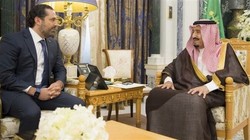 UN investigators say a close aide to Saudi Crown Prince Mohammed bin Salman, who was involved in the assassination of Jamal Khashoggi, had played a central role in the abduction and interrogation of Lebanese Prime Minister Saad Hariri on Saudi soil two years ago.
UN investigators say a close aide to Saudi Crown Prince Mohammed bin Salman, who was involved in the assassination of Jamal Khashoggi, had played a central role in the abduction and interrogation of Lebanese Prime Minister Saad Hariri on Saudi soil two years ago. RNA - In a report released, UN Special Rapporteur Agnes Callamard said that Saud al-Qahtani, who was said to have been fired last year for his role in the killing of prominent dissident journalist Khashoggi, was one of two officials who had “personally interrogated and threatened” Hariri at the notorious Riyadh Ritz-Carlton hotel after being summoned to the capital in 2017.
“People close to the incident suggested the prime minister was a victim of ‘psychological torture’ and treatment that may have been ‘cruel, inhuman and degrading,’” the UN official said in her report, which was based on a six-month investigation.
She said that Qahtani was involved in the kingdom’s bid back then to force Hariri to resign as Lebanon’s prime minister.
According to eight Saudi, Arab and Western diplomatic sources, Hariri was also verbally humiliated and beaten during his detention in the kingdom.
Hariri stunned Lebanon and the world on November 4, 2017 by announcing his resignation in a live television broadcast from Saudi Arabia. He accused Iran and Hezbollah of sowing strife in the Arab world, an allegation rejected by both sides.
Senior sources close to Hariri and top Lebanese officials said Riyadh had coerced the Lebanese premier into stepping down and put him under house arrest.
Lebanese President Michel Aoun stressed at the time that the prime minister was being detained in Saudi Arabia against his will.
Sayyed Hassan Nasrallah, Hezbollah’s Secretary General, also noted that Saudi authorities had clearly and openly declared a war on Lebanon by holding Hariri hostage and forcing him to quit.
Hariri, however, managed to get out of the kingdom amid international pressure on Riyadh.
He rescinded his resignation after returning home. The prime minister has, himself, denied that he was mistreated during his stay in Riyadh.
A New York Times report later revealed that Hariri, upon arrival in Riyadh, had found himself manhandled by Saudi forces and forced to resign.
The UN’s report also detailed the results of an inquiry into the murder of Saudi journalist Khashoggi.
Khashoggi, a former advocate of the Saudi royal court who later became a critic of bin Salman, was killed and his body was dismembered by a Saudi hit squad after being lured into the Saudi consulate in Istanbul on October 2, last year.
The Washington Post, for which Khashoggi was a columnist, reported in November last year that the CIA had concluded that Bin Salman personally ordered his killing. Riyadh strongly denies the allegation, claiming that the murder has been carried out by a “rogue” group.
Qahtani, believed to be bin Salman’s right-hand man, is one of the highest-profile figures implicated in the brutal assassination of Khashoggi.
According to reports, Qahtani has not been charged with any crime and continues to work closely with the crown prince despite being dismissed from his official position.
Qahtani’s firing reflected the Saudi government's acknowledgement that he was involved in Khashoggi's death, according to the UN's Wednesday report.
847/940